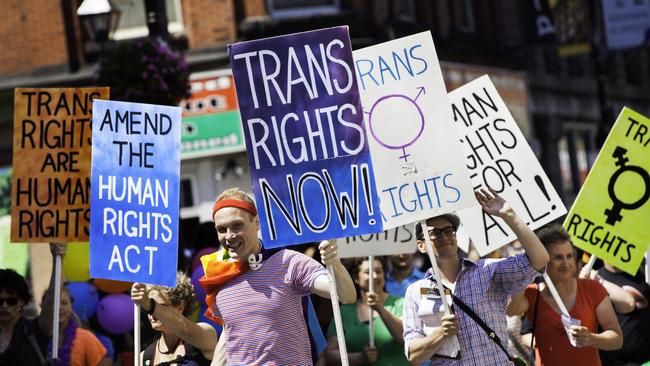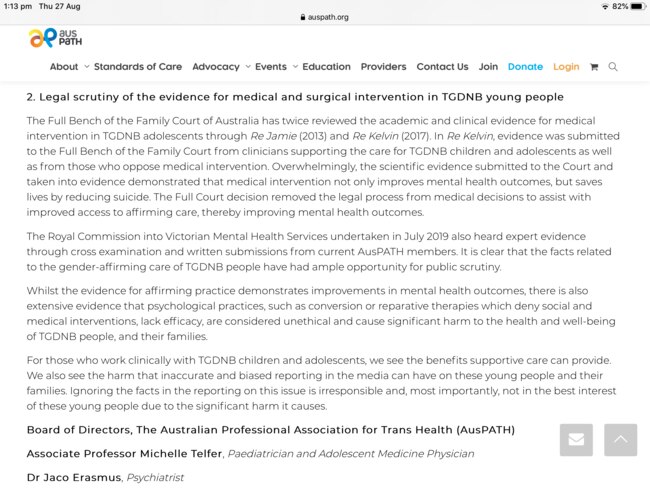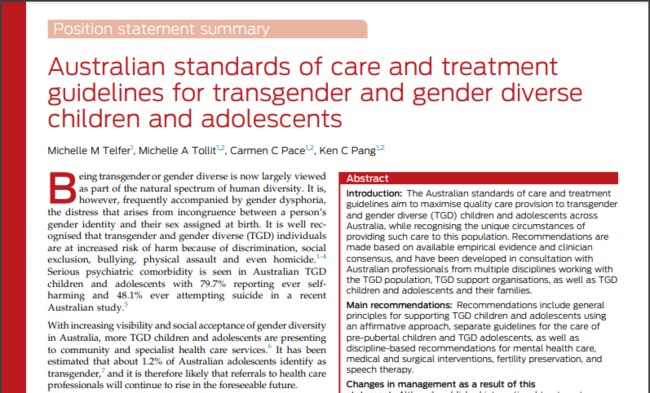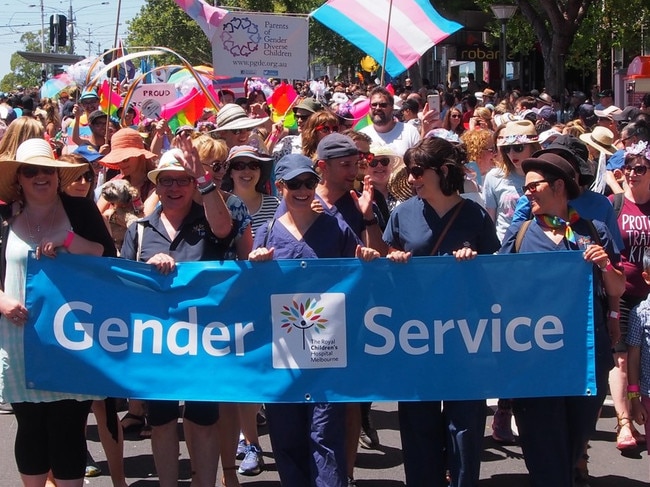Trans lobby ‘buries’ defence of hormone drugs
The gender clinicians lobby has quietly buried its past defence of the treatment guideline justifying trans hormones for minors.

The gender clinicians lobby has quietly buried its past, strident defence of the Royal Children’s Hospital treatment guideline that is used to justify life-altering hormone drugs and surgery for minors who feel distress over being “born in the wrong body”.
The Australian Professional Association for Trans Health, a hybrid body of 250-odd clinicians and activists, has dropped from its “news and advocacy” web page the 2019 media statement that claimed these medical interventions had withstood academic and legal scrutiny at “the highest level”.
The 2018 RCH treatment guideline, badged as “Australian standards of care” and adopted by major clinics across the country, encourages young children to take the lead in living as the opposite sex, and promotes early medical interventions starting with the onset of puberty.
After The Australian reported concerns about the safety and ethics of “gender affirmative” medicine with minors, AusPATH issued an August 2019 statement insisting this approach was backed by strong scientific evidence and had undergone “ample” public scrutiny in Family Court cases and before Victoria’s royal commission into mental health.
But that statement of staunch defence — quoted by the ABC, Guardian Australia and other media outlets — has been archived following recent challenges to the credibility of the 2018 RCH treatment guideline and its lead author, RCH gender clinic director and paediatrician Michelle Telfer.

In a September 2020 case involving irreversible cross-sex hormones for a 16-year-old known as “Imogen”, Family Court judge Garry Watts found the RCH guideline was misleading clinicians about the law by advising them “parental consent is not required when the adolescent is considered to be competent to provide informed consent”.
After this setback, the RCH guideline’s legal advice section was changed online without explanation and all references to celebrated past Family Court decisions, which had favoured the gender clinic model, were removed. The current guideline makes no mention of the ruling in Imogen’s case.
In October 2020, The Australian understands, a senior psychiatrist wrote to the Victorian royal commission to express concern about the accuracy of the July 2019 testimony by Dr Telfer, who was lobbying for more money so RCH could become the first children’s hospital in the country to carry out “chest reconstruction surgery” for teenage girls who identify as boys and want their breasts removed.
The psychiatrist also reportedly told the commissioners that AusPATH with its media statement was using Dr Telfer’s appearance before them as proof that the gender affirmative treatment model had been vindicated by public legal scrutiny.
Video: Author Abigail Shrier on adolescent-onset gender dysphoria
The calibre of treatment guidelines is a key area of dispute in the international debate about whether youth gender clinics have a solid enough evidence base to justify their life-altering medical interventions.
In December the US-based Endocrine Society, whose 2017 guideline champions medicalised gender change for minors and is followed internationally, joined the intensifying debate and complained of “misinformation” behind a rash of draft laws to ban hormone drugs and trans surgery for minors in 17 US states.
On Monday the Republican state of Arkansas became the first jurisdiction to pass such a law; it will take effect unless vetoed by the governor within five days. In March, South Carolina state representative Cezar McKnight became the first Democrat to initiate a similar bill, which he said was not “anti-trans”.
“I just don’t think to make a sex change during the teen years is something someone should do,” he told the news agency AP, pointing out that black Democrats like himself “tend to be more conservative than white progressives”.
The Endocrine Society guideline, as well as the guideline from AusPATH’s global counterpart, the World Professional Association for Transgender Health, are expected to be scrutinised by English Court of Appeal judges in June when they hear the appeal of the Tavistock gender clinic against December’s landmark legal victory by detransitioner Keira Bell.
Neither guideline amounts to a “standard of care”, according to US endocrinologist Will Malone and three medical colleagues whose letter critical of the Endocrine Society’s promotion of invasive gender treatment for minors was published this week by the Journal of Clinical Endocrinology & Metabolism.
“A standard of care is a widely accepted practice that any competent clinician would agree is appropriate, but gender medicine is far from settled science — there is no standard of care,” Dr Malone told The Australian.
Dr Malone, a director of the Society for Evidence-Based Gender Medicine, which encourages psychosocial support for young people with gender dysphoria, said the Endocrine Society’s guideline advice on puberty blockers was based on data rated as “low quality” or “very low quality” on the GRADE evidence rating system.
“It’s important for people to realise that the quality of recommendations coming out of any guideline will only be as good as the data those recommendations are based on,” he said.
“The Endocrine Society and WPATH guidelines are an ‘opinion’ of one way to manage gender dysphoria, and shouldn’t be presented as the ‘only’ way to manage gender dysphoria.
“Given the lack of quality evidence in this area, safety concerns about interventions, a changing demographic of those with gender dysphoria and reports of transition regret, no opinion about how to manage gender dysphoria at this point in time can be considered authoritative.”

The version of the RCH guideline published as a 2018 peer reviewed paper by the Medical Journal of Australia says: “The scarcity of high quality published evidence on the topic prohibited the assessment of level (and quality) of evidence for these recommendations.”
This acknowledgment does not appear in the full guideline available on the RCH website and used by other gender clinics such as the Children’s Hospital at Westmead, Sydney.
Standards issued by the National Health and Medical Research Council say those developing guidelines should “grade the strength” of the evidence for each recommendation.
The RCH guideline was considered for inclusion in the NHMRC’s online portal Australian Clinical Practice Guidelines but did not qualify.
“At the screening stage it was determined that the guideline did not include a funding statement, an evidence base for the recommendations or information about conflict of interest, and that it would not meet the portal selection criteria, so a full assessment was not carried out,” a spokeswoman for the NHMRC said.

The RCH guideline says its advice to clinicians is based “primarily on expert consensus” as well as other guidelines including those from WPATH and the Endocrine Society.
The RCH document does not cite the landmark 2015 Dutch “empirical ethical” study which interviewed 36 gender clinicians from 10 countries about the push to give puberty blocker drugs at younger ages.
“As long as there are only limited long-term data in support of the (WPATH and Endocrine Society) guidelines, there will be no true consensus on treatment,” the authors concluded.
“To advance the ethical debate, we need to continue to discuss the diverse themes based on research data as an addition to merely opinions.”
The RCH guideline also does not cite the 2018 Pediatrics paper billed as the first systematic review of the medical literature on puberty blockers and cross-sex hormones for adolescents.
The Pediatrics paper concluded that evidence on the “psychosocial and cognitive impact (of these hormonal interventions was) generally lacking”. Paediatrician Ken Pang, who leads research at Dr Telfer’s RCH clinic, was one of the authors of this systematic review.
In a rare public comment, RCH issued a December 2019 open letter saying its treatment guidelines had been “peer reviewed at the highest level”, and Dr Telfer’s gender clinic relied on “the best available medical evidence” and followed “strict clinical governance standards”.
In a submission to the Senate inquiry into media diversity, complaining about The Australian’s coverage, Dr Telfer points to The Lancet journal devoting an editorial to the RCH treatment guideline and a profile article “celebrating my international influence in the field”.
She says the treatment guideline is “accepted as the current gold standard care for Australia”.
The Australian put detailed questions to AusPATH, the Endocrine Society, RCH, Dr Telfer and Victorian government authorities responsible for the royal commission; they did not reply.
UPDATE: After publication of this article on March 31, AusPATH’s August 2019 statement in defence of the “gender affirmative” model was reposted to its news webpage, without announcement or explanation. The Australian sought comment from AusPATH directors about this but they did not reply.



To join the conversation, please log in. Don't have an account? Register
Join the conversation, you are commenting as Logout